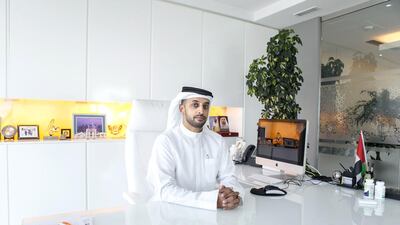On May 22 2013, an important message came from the office of Sheikh Mohammed bin Rashid, Vice President of the UAE and Ruler of Dubai.
“The deadline for the e-government project is two years. We will never tolerate any failure in achieving this goal,” the ruler tweeted.
He wanted the whole of the business of Dubai government departments and authorities to be conducted electronically, with an end to the bureaucratic paperwork that he believed slowed government down and put obstacles in the way of business efficiency.
For Ahmed bin Sulayem, head of the Dubai Multi-Commodities Centre free zone, it became a matter of professional and personal pride to hit that deadline, and, with a couple of days to go, he believes he has. “We’re there. You can now go from start to finish at DMCC – from first inquiry to registering to actually doing business – entirely online,” he says.
To prove it, he’s happy to take me on a tour of the DMCC facilities. In the past, the Client Service Centre in Al Mas Tower, the free zone’s headquarters, would be packed with people filling in forms or waiting in line with bundles of documents to be reviewed – potential customers, public relations officers, messengers.
“The queue would begin here and go round the entire building,” says Mr bin Sulayem, indicating a now-empty waiting space in the centre. There are still a few people in the service area, clutching documents, but he explains that some original documents have to be submitted and items like passports, visa and salary certificates will remain in paper form “until there is buy-in from all the relevant government departments”.
Nonetheless, he is satisfied that DMCC has gone further down the paperless route than most government departments, and also believes the move to e-administration has been a catalyst in the growth of DMCC.
Recently, the centre – which is Dubai’s hub for the trade in and finance of commodities ranging from gold and diamonds to tea and spices – announced the registration of its 10,000th client.
That represents a rapid rate of growth since the DMCC was set up in 2002, faster than any other free zone entity in the emirate.
It is also at the heart of the Jumeirah Lakes Towers development, which in the same period has grown out of empty desert to become a stand-alone community in Dubai, with 66 high-rise buildings providing jobs and facilities – hotels, restaurants, shops – for a population of 85,000 people.
“The paperless move has been very good for us. We wouldn’t have been able to get to the 10,000 figure with the old system,” he says, pointing out that the DMCC’s administrative workforce is the same as it was when there were only 3,000 customers in the free zone.
Back to the tour of Al Mas, Mr bin Sulayem leads us to the diamond trading area. Diamonds will be an important element in the next phase of expansion.
The DMCC’s ambitions in the trade in the precious stones have been growing for several years, to the point where Dubai is now in the top three diamond centres in the world, along with Antwerp and Mumbai.
The most recent initiative has been in the financing of the multibillion dollar trade in diamonds, aiming to fill the gap left by the withdrawal of the Antwerp Diamond Bank, which closed its Dubai office as part of a run-down of its global operations.
National Bank of Fujairah has jumped into that gap, taking over the offices (and several of the staff) of the Antwerp bank, and two other local banks – Emirates NBD and Mashreq – have pledged to back the DMCC’s diamond plans with hard cash.
As if by magic, in the lift we bump into a banker who has called into the DMCC to discuss financing trade in the stones, while on the floor itself we bump into a Belgian trader who is sorting little bags of gems ahead of an online diamond auction. “I promise you, this is all coincidence,” says Mr bin Sulayem. But it is proof that the diamond initiative is advancing rapidly.
Other commodities will follow. “Cashews from Africa, and other perishable goods, maybe flowers and coffee. If trade with Iran opens up, Dubai will be the prime option for many companies. Iran has the biggest business in pistachios in the world, bigger than the US,” he says.
His other big project is the Burj 2020 tower, a skyscraper planned on the edge of the DMCC free zone which is billed to be the tallest commercial building in the world. Mr bin Sulayem says it will beat the record-holding Shanghai Tower, which should soon top out at 632 metres.
With all this breakneck growth, is there a risk the DMCC’s regulatory structure will not be able to keep pace? And is the regulatory process moving completely online too? These questions are especially timely in light of the DMCC’s decision in April to remove the Kaloti gold group from the list of companies that meet its sourcing standards.
“We have the mechanisms in place. The compliance department has the full range of know-your-customer and due diligence capabilities, and they do it personally, not just online. Anybody thought to be high risk is checked and double-checked.
“Compliance has always been a very important part of DMCC. We adhere to international standards in the Kimberly Process [for diamond provenance] and according to OECD guidelines. We have arrangements with the UAE Central Bank on anti-money laundering regulations.
“We don’t want to attract the wrong type of business to DMCC. That would deter other clients like the big multinationals.”
fkane@thenational.ae
Follow The National's Business section on Twitter

